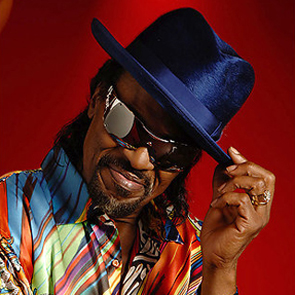I was discussing the column with my friend Michael last week. Michael is something of a music expert whose opinion I value. I mentioned that after seven years of writing the column every week it’s not always easy to come up with something new. Michael asked if I had ever written about Chuck Brown & the Soul Searchers. I’ve written so many installments of the column that sometimes I don’t remember who I’ve written about, so I did a search. Sure enough, Brown and his band had not been featured in this space previously, Thanks for the suggestion, Michael.
Go-go. To people of my generation, it meant young women in cages or on platforms dancing intensely to 60s music. But if you are from the Washington, DC area, go-go means something else entirely to you. For you, go-go is a combination of funk and R&B that became popular in DC in the mid-70s. Many regional bands were part of the go-go scene but it is undeniable that Chuck Brown & the Soul Searchers were the musicians who laid the groundwork for the music that became a sensation. In fact, Brown is known as the “Godfather of Go-Go.”
Brown grew up in poverty with an absent father in Gaston, North Carolina before moving to Washington, DC with his mother when he was six-years-old. By the time he was 15, Brown had dropped out of school and was living on the streets, making some money by shining shoes. He got into real trouble when he got into a fight and the person he was fighting died. Although Brown claimed self-defense, he was sentenced to eight years in prison for murder.

It was in prison that Brown first got his hands on a guitar and started learning to play the instrument. When he was released, he moved back to Washington and began to perform at parties while making money at odd jobs like bricklayer and sparring partner at area gyms. Brown’s music career began in earnest when he began to play with groups like the Earls of Rhythm and Los Latinos in the 60s and he continued performing until his death in 2012, achieving enormous popularity in the DC area.
Brown’s recording career began with the 1972 Soul Searchers album We the People which was followed by Salt of the Earth two years later. But it was the third Soul Searchers album, Bustin’ Loose, that really put the band on the map. The album was released in 1979 and sold 500,000 copies, earning a Gold Record. The title single also attained gold status and topped the R&B chart for four weeks while crossing over to Top 40 success on the Pop chart. You can recognize parts of “Bustin’ Loose” in Nelly’s 2002 smash “Hot in Herre.”
Brown continued releasing albums right up until his death and beyond with 2014’s Beautiful Life. His influence on bands like the Soul Rebels Brass Band, Junk Yard Band, Rare Essence, and Trouble Funk is undeniable. Local promoter Darryl Brooks said, “He was a symbol of D.C. manhood, back in the day, because of the authority that he spoke with. He just spoke from a perspective that black men could understand.”
Brown was accorded numerous honors and awards during his lifetime including a National Heritage Fellowship in 2005. It is the highest honor that the United States awards in traditional and folk arts. Brown was nominated for a Grammy Award in 2011 for the song “Love” which he recorded with Jill Scott and Marcus Miller, and that same year he was honored at a National Symphony Orchestra concert on the West Lawn of the U.S. Capitol Building.





Comments